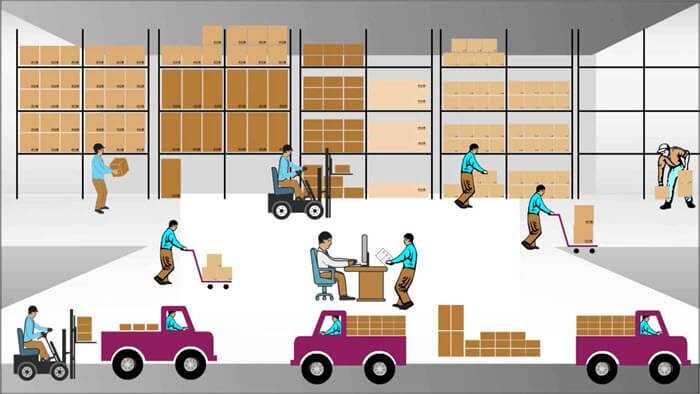Warehouse Management System
Warehouse Management Systems (WMS) help us in managing all these operations. Warehouse management systems help organizations in developing their competitive edge. The use of WMS will minimize the labor charges and thereby improve customer services.
Cloud-based WMS will give us visibility to the real-time data, which will show the status of the inventory. If we have the internet, we will be able to see it on computers, phones, tablets, etc.

Also Read =>> Best Label Printer For Shipping
The warehouse management system starts keeping a track of the material/goods/products once it reaches the warehouse. WMS will track the item until it reaches the end-customer.
If it is returned by the customer, WMS will again start tracking, until it reaches another end-customer. Hence, the functions of WMS include receiving goods, packing it, dispatching goods, tracking the shipment and updating its information. All these functions together can be called a supply chain.
Types of WMS:
For 3PL businesses, there can be three types of WMS.
3PL stands for third-party logistics. The first type is Standalone Warehouse Management, the Second type is Supply Chain Execution Modules and the Third type is Integrated ERP.
Enlisted below are some pointers that you must consider while choosing the WMS.
Function: Different WMS has different functions. Some WMS are designed for specific types of businesses. Hence, identify your needs and choose accordingly.
Cost: After considering the functions for your WMS, the cost is the second important factor while choosing a WMS as it involves budget. The cost of WMS depends on its complexity or the functions that it offers.
Customer Needs: If you are using any WMS currently then you must know its loopholes.
Based on it, you can identify the customer needs and choose the functions of WMS so that you will be able to give the best service to your customers. This point is also about selecting/considering functions of the WMS but from the customer’s point of view.
Warehouse Size: As the warehouse-size increases, the complexity of WMS will increase as WMS will have to provide more functions for larger warehouses. Hence depending on the size of the warehouse, you will have to choose the functions. Thus this point is also about selecting functions but from the warehouse point of view.
=> Contact us to suggest a listing here.
Categories
- Artificial Intelligence
- Business Intelligence
- Business Process
- Business Transformation
- Cloud ERP Implementations
- Consulting
- Coronavirus and Digital Transformation
- CRM Implementations
- Cyber Security
- Data Management
- Digital Strategy
- Digital Stratosphere
- Digital transformation
- digital transformation case studies
- Digital Transformation News
- E-Commerce
- Emerging Technology
- ERP architecture
- ERP Consulting
- ERP Expert Witness
- ERP Failures
- ERP Implementations
- ERP project
- ERP software selection
- ERP Systems Integrators
- ERP Thought Leadership
- Executive Leadership in Digital Transformation
- Future State
- Global ERP Implementations
- HCM Implementations
- IFS
- Independent ERP
- Independent ERP Consultants
- Internet of Things
- Manufacturing ERP Systems
- Mergers and Acquisitions
- Microsoft D365
- Microsoft D365 Consultants
- Microsoft Dynamics 365 Implementations
- Microsoft Sure Step
- NetSuite Implementations
- OCM
- Odoo
- Oracle Cloud ERP Implementations
- Oracle ERP Cloud Expert Witness
- Oracle ERP Cloud Failures
- Organizational Change Management
- Project Management
- Quality Assurance
- Quickbooks
- Remote ERP
- Sage 100
- SAP Activate
- SAP Expert Witness
- SAP failures
- SAP S/4HANA Implementations
- SAP S/4HANA vs. Oracle vs. Microsoft Dynamics 365
- SAP vs Oracle vs Microsoft Dynamics
- SAP vs. Oracle
- Small Business ERP Implementations
- Small Business ERP Systems
- Software Selection
- Software Testing
- Software Vendors
- SuccessFactors Implementations
- Supply Chain Management
- System Architecture
- Systems Integrators
- Technology Consultant
- Top ERP software
- Uncategorized
- Warehouse Management Systems
- Workday Implementations
Methodology for ranking the top warehouse management systems
Our independent comparison of the leading WMS systems considers a number of factors. We evaluated our experience in helping clients select and implement the systems, product innovation, flexibility, and overall product roadmap.
In addition, we evaluated a number of functional criteria that are critical to warehouse management, such as:
- Pick, pack, and ship processes
- Order fulfillment
- Inventory and cycle counting
- Docking
- Transportation management (if applicable)
- Analytics and reporting
The evaluation also considers average cost, risk, and benefits, along with both quantitative and qualitative factors.
Note that this ranking was completed without influence or compensation from any outside software vendors or systems integrators, so this is 100% objective based on our experience and research with various WMS software.
How to choose the best WMS system?
Choosing the best WMS system can be overwhelming. While this top 10 list is meant to be a useful data point, it is a starting point that needs to be aligned with your business needs and requirements.
When choosing the best WMS system, it can also be helpful to evaluate broader enterprise technologies. When assembling your WMS shortlist, be sure to also see our ranking of top ERP systems and top supply chain management systems. This can help ensure that you consider all of your options as part of your overall digital transformation strategy.
Feel free to contact me if you would like to brainstorm ideas related to your WMS, supply chain, or ERP initiative. My team and I are happy to be a sounding board as you continue your digital transformation journey!




























